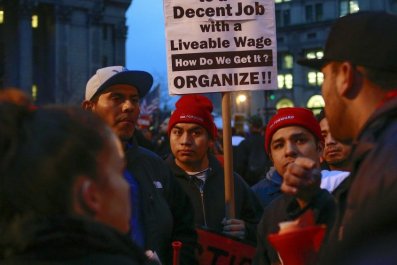The budget debate now consuming Washington often seems to come down to guns versus butter, or at least its contemporary manifestation, Reaper Drones versus food stamps.
What gets lost in the increasingly caustic rhetoric is just how inefficient the U.S. government is when it spends, especially when it is outsourcing tasks to hugely profitable private companies.
Fortunately, the budget deal just worked out between the White House and Capitol Hill will prevent a government shutdown and all of its attendant global financial inconveniences. But it does nothing to curtail wasteful spending on companies that are among the nation's richest and most powerful - from Booz Allen Hamilton, the $6 billion-a-year management-consulting firm, to Boeing, the defense contractor boasting $82 billion in worldwide sales.
In theory, these contractors are supposed to save taxpayer money, as efficient, bottom-line-oriented corporate behemoths. In reality, they end up costing twice as much as civil servants, according to research by Professor Paul C. Light of New York University and others has shown. Defense contractors like Boeing and Northrop Grumman cost almost three times as much.
Essentially, the federal government operates two contracting systems, separate and unequal. One hires profit-making corporations, the other handles nonprofits.
Washington lavishes taxpayers' money on for-profits. Many smaller contracting firms making good money for doing relatively little work ring the nation's capital and are commonly known as Beltway Bandits. Remarkably, some of these enterprises set themselves up with a Bermuda mailbox to escape paying the federal taxes - perhaps most notably Accenture, which runs the IRS website. (Accenture maintains that its structure was not designed to avoid taxes.)
According to USAspending.gov, a website created by the Obama administration so taxpayers could check up on contractors, for-profit already-signed government contracts total $33 trillion as of today, with the Fluor engineering firm alone getting $116 billion. Fluor spokesman Keith Stephens says the government website figure is seriously wrong - on October 31, the company reported $2.1 billion of revenue from the federal government in the first nine months of this year. (The spending website also shows $5 trillion in IRS contracts, which has to be nonsense because that figure equals about 500 years of budgets for the tax agency. For six months I have been trying to get the IRS to explain this absurdity, so far to no avail.)
The upshot is that usaspending.gov produces unreliable numbers, crazily unreliable numbers. It is another example of the administration's promise of transparency and failure to deliver.
But shoddy work doesn't mean you will get fired from a government contract. Nor can that lackluster effort, like the disaster that is the Obamacare signup website, be blamed on inadequate pay to hire talent to set up a reliable website. Last year, contractors were allowed to charge the government as much as $762,029 per worker.
Under the new budget deal, there was a small effort to reform this spendthrift system. The top contractor salary that can be charged to taxpayers is expected to fall to $487,000, a bit more than President Obama's $400,000 salary.
For-profit contractors charge not just for salaries, but also for management pay and perks - like corporate golf outings and executive retreats - as well as the cost of renting space or operating buildings the contractors own, plus any other overhead. In a congressional hearing in March Senator Claire McCaskill, D-Missouri, revealed that of the $31.5 billion in invoices contractors submitted to the U.S. Army, $16.6 billion was for overhead.
The nonprofit contractors that get federal contracts are varied. They include soup kitchens and emergency shelter providers, some run by churches and others by secular institutions. They are forced to operate under much more stringent rules than those regulating the for-profit sector.
A study by the investigative arm of Congress, the Government Accountability Office, found that many nonprofit contractors get between nothing and 3 percent of a contract to cover overhead, a sum the office said was woefully inadequate. Urban Institute studies show that overhead costs for nonprofit human services agencies typically run about 17 percent. "The government expects nonprofits to do work for less than the cost of doing the work," said Rick Cohen, who negotiated nonprofit contracts with federal agencies and now writes about such issues for Nonprofit Quarterly.
Cohen broke into laughter when asked about a nonprofit billing for overhead costs. "Unlike corporations, the feds don't let you charge anything for indirect costs, certainly not anything close to reality," he said. "Corporate contractors operate in whole different world from nonprofits," which he said are treated with suspicion and are closely audited compared to corporate contractors.
"The government also makes it a practice to be late paying nonprofits, which is why so many of them are in a constant cash crisis," he said.
When asked about a nonprofit seeking reimbursement for a salary in the hundreds of thousands of dollars, as for-profits routinely do, Cohen chuckled. "Out of the question," he said. "Beyond imagining."
A host of studies going back more than 30 years has shown that nonprofit contractors, particularly human service agencies, cost far less than civil servants, and generally pay less and offer fewer benefits than government or corporations.
But nonprofit contractors operate under tougher rules than for-profits. And Uncle Sam lays a heavier hand on them, and the poor, than on for-profit contractors. For example, math errors on tax forms can result in poor people being denied tax credits for two years. The government is much more lenient with corporate contractors caught cheating on their contracts or taxes. These firms can be debarred, bureaucratic-speak for being banned for misconduct. But the principals just organize a new business and quickly get new contracts. "Private contractors know how to play the system," says Scott Amey, general counsel at the Project on Government Oversight, a watchdog that barks about the high cost of military contractors.
Pentagon auditors identify contractors that fail to pay taxes or, in some cases, broke the law by not withholding taxes from worker paychecks. When they get caught, the Pentagon terminates the contracts, but does not disclose their names.
About 27,000 Pentagon contractors, one in nine, evaded taxes and yet continued to get Defense Department contracts, according to a 2004 GAO study requested by then-senator Norm Coleman, a Minnesota Republican. The Pentagon says federal law prevents it from identifying any of the firms by name.
It's not as if this can't be fixed. Congress could ban the owners and executives of any firm that does this from any government contracts for 10 years, the same penalty it applies to the working poor who cheat on the Earned Income Tax Credit. It could also make public the names of contractors, and their major owners, caught cheating on their taxes.
Congress could also save taxpayers money - as much as $300 billion annually, according to Light's research - by replacing corporate contract workers with civil servants, streamlining bureaucratic management and at the same time relying more on low-cost nonprofit contractors while paying them enough to be effective and efficient.
But without popular demand to stop lavishing money on corporate contractors whose work does not measure up, the chances for real reform are about the same as the perennial political promise of more government for less money.
























